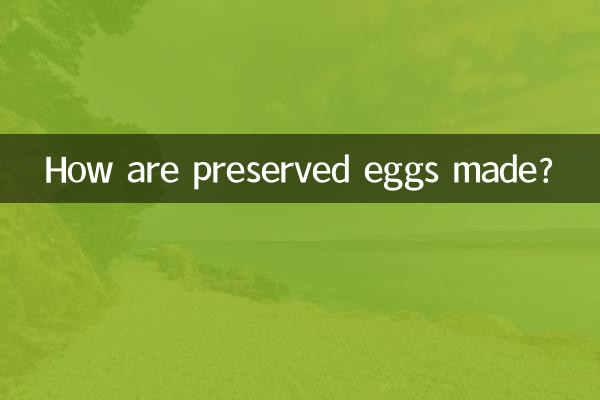How are preserved eggs made?
Preserved eggs, also known as preserved eggs or preserved eggs, are one of the traditional Chinese foods and are deeply loved by people for their unique flavor and appearance. In recent years, with the rise of healthy eating, the production process and nutritional value of preserved eggs have become a hot topic. This article will introduce in detail the production process, historical origins and relevant data of preserved eggs to help readers fully understand this traditional delicacy.
1. The historical origin of preserved eggs

The history of preserved eggs can be traced back to the Ming Dynasty, and it is said that they were first discovered accidentally by a farmer in Hunan. After hundreds of years of development, the production process of preserved eggs has been continuously improved, and now it has become an important part of Chinese food culture. In recent years, preserved eggs have frequently been on hot searches due to their unique production process and nutritional value, becoming the focus of food lovers.
2. Production process of preserved eggs
The process of making preserved eggs seems simple, but actually involves many delicate steps. The following are the main steps for making preserved eggs:
| steps | Operation | time |
|---|---|---|
| 1 | Select eggs | 1 day |
| 2 | Prepare marinade | 2 hours |
| 3 | covered in mud | 1 hour |
| 4 | pickled | 20-30 days |
| 5 | dry | 3-5 days |
3. Nutritional value of preserved eggs
Preserved eggs not only have a unique flavor, but are also rich in various nutrients. The following is the main nutritional composition list of preserved eggs:
| Nutritional information | Content (per 100g) |
|---|---|
| protein | 14.2 grams |
| fat | 10.6 grams |
| carbohydrates | 4.5 grams |
| Calcium | 82 mg |
| iron | 3.1 mg |
4. Precautions for eating preserved eggs
Although preserved eggs are delicious, you still need to pay attention to the following points when eating them:
1.Eat in moderation: Preserved eggs contain a certain amount of lead, and excessive consumption may be harmful to health.
2.Eat with: It is recommended to eat it with vinegar, ginger and other seasonings, which can not only enhance the flavor, but also neutralize the alkalinity of preserved eggs.
3.Choose regular products: When purchasing, you should choose preserved eggs produced by regular manufacturers to avoid purchasing substandard products.
5. Modern innovation of preserved eggs
In recent years, with the development of food technology, the production process of preserved eggs has also been constantly innovated. Some manufacturers have begun to adopt lead-free processes to make preserved eggs healthier. In addition, the ways of eating preserved eggs are also more diversified, such as preserved egg mixed with tofu, preserved egg lean meat porridge, etc., becoming a new favorite on the modern dining table.
Conclusion
As a traditional Chinese delicacy, preserved eggs not only carry rich cultural connotations, but also have unique nutritional and edible values. Through the introduction of this article, I believe everyone has a deeper understanding of the production process and nutritional value of preserved eggs. While enjoying delicious food, don’t forget to pay attention to healthy eating and reasonable combination, so that preserved eggs can add more deliciousness and fun to our lives.

check the details

check the details